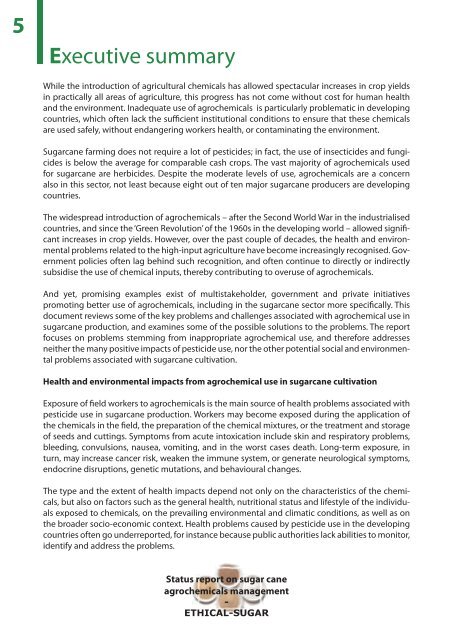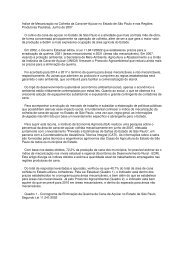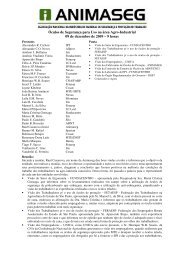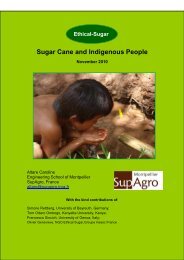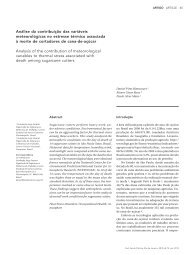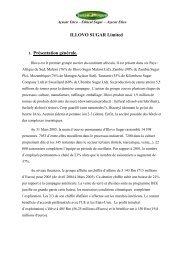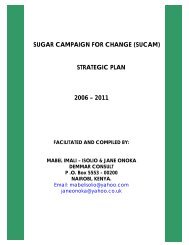Status report on sugar cane agrochemicals ... - Sucre Ethique
Status report on sugar cane agrochemicals ... - Sucre Ethique
Status report on sugar cane agrochemicals ... - Sucre Ethique
Create successful ePaper yourself
Turn your PDF publications into a flip-book with our unique Google optimized e-Paper software.
5<br />
Executive summary<br />
While the introducti<strong>on</strong> of agricultural chemicals has allowed spectacular increases in crop yields<br />
in practically all areas of agriculture, this progress has not come without cost for human health<br />
and the envir<strong>on</strong>ment. Inadequate use of <strong>agrochemicals</strong> is particularly problematic in developing<br />
countries, which often lack the su� cient instituti<strong>on</strong>al c<strong>on</strong>diti<strong>on</strong>s to ensure that these chemicals<br />
are used safely, without endangering workers health, or c<strong>on</strong>taminating the envir<strong>on</strong>ment.<br />
Sugar<strong>cane</strong> farming does not require a lot of pesticides; in fact, the use of insecticides and fungicides<br />
is below the average for comparable cash crops. The vast majority of <strong>agrochemicals</strong> used<br />
for <strong>sugar</strong><strong>cane</strong> are herbicides. Despite the moderate levels of use, <strong>agrochemicals</strong> are a c<strong>on</strong>cern<br />
also in this sector, not least because eight out of ten major <strong>sugar</strong><strong>cane</strong> producers are developing<br />
countries.<br />
The widespread introducti<strong>on</strong> of <strong>agrochemicals</strong> – after the Sec<strong>on</strong>d World War in the industrialised<br />
countries, and since the ‘Green Revoluti<strong>on</strong>’ of the 1960s in the developing world – allowed signi� -<br />
cant increases in crop yields. However, over the past couple of decades, the health and envir<strong>on</strong>mental<br />
problems related to the high-input agriculture have become increasingly recognised. Government<br />
policies often lag behind such recogniti<strong>on</strong>, and often c<strong>on</strong>tinue to directly or indirectly<br />
subsidise the use of chemical inputs, thereby c<strong>on</strong>tributing to overuse of <strong>agrochemicals</strong>.<br />
And yet, promising examples exist of multistakeholder, government and private initiatives<br />
promoting better use of <strong>agrochemicals</strong>, including in the <strong>sugar</strong><strong>cane</strong> sector more speci� cally. This<br />
document reviews some of the key problems and challenges associated with agrochemical use in<br />
<strong>sugar</strong><strong>cane</strong> producti<strong>on</strong>, and examines some of the possible soluti<strong>on</strong>s to the problems. The <str<strong>on</strong>g>report</str<strong>on</strong>g><br />
focuses <strong>on</strong> problems stemming from inappropriate agrochemical use, and therefore addresses<br />
neither the many positive impacts of pesticide use, nor the other potential social and envir<strong>on</strong>mental<br />
problems associated with <strong>sugar</strong><strong>cane</strong> cultivati<strong>on</strong>.<br />
Health and envir<strong>on</strong>mental impacts from agrochemical use in <strong>sugar</strong><strong>cane</strong> cultivati<strong>on</strong><br />
Exposure of � eld workers to <strong>agrochemicals</strong> is the main source of health problems associated with<br />
pesticide use in <strong>sugar</strong><strong>cane</strong> producti<strong>on</strong>. Workers may become exposed during the applicati<strong>on</strong> of<br />
the chemicals in the � eld, the preparati<strong>on</strong> of the chemical mixtures, or the treatment and storage<br />
of seeds and cuttings. Symptoms from acute intoxicati<strong>on</strong> include skin and respiratory problems,<br />
bleeding, c<strong>on</strong>vulsi<strong>on</strong>s, nausea, vomiting, and in the worst cases death. L<strong>on</strong>g-term exposure, in<br />
turn, may increase cancer risk, weaken the immune system, or generate neurological symptoms,<br />
endocrine disrupti<strong>on</strong>s, genetic mutati<strong>on</strong>s, and behavioural changes.<br />
The type and the extent of health impacts depend not <strong>on</strong>ly <strong>on</strong> the characteristics of the chemicals,<br />
but also <strong>on</strong> factors such as the general health, nutriti<strong>on</strong>al status and lifestyle of the individuals<br />
exposed to chemicals, <strong>on</strong> the prevailing envir<strong>on</strong>mental and climatic c<strong>on</strong>diti<strong>on</strong>s, as well as <strong>on</strong><br />
the broader socio-ec<strong>on</strong>omic c<strong>on</strong>text. Health problems caused by pesticide use in the developing<br />
countries often go under<str<strong>on</strong>g>report</str<strong>on</strong>g>ed, for instance because public authorities lack abilities to m<strong>on</strong>itor,<br />
identify and address the problems.<br />
<str<strong>on</strong>g>Status</str<strong>on</strong>g> <str<strong>on</strong>g>report</str<strong>on</strong>g> <strong>on</strong> <strong>sugar</strong> <strong>cane</strong><br />
<strong>agrochemicals</strong> management<br />
-<br />
ETHICAL-SUGAR


